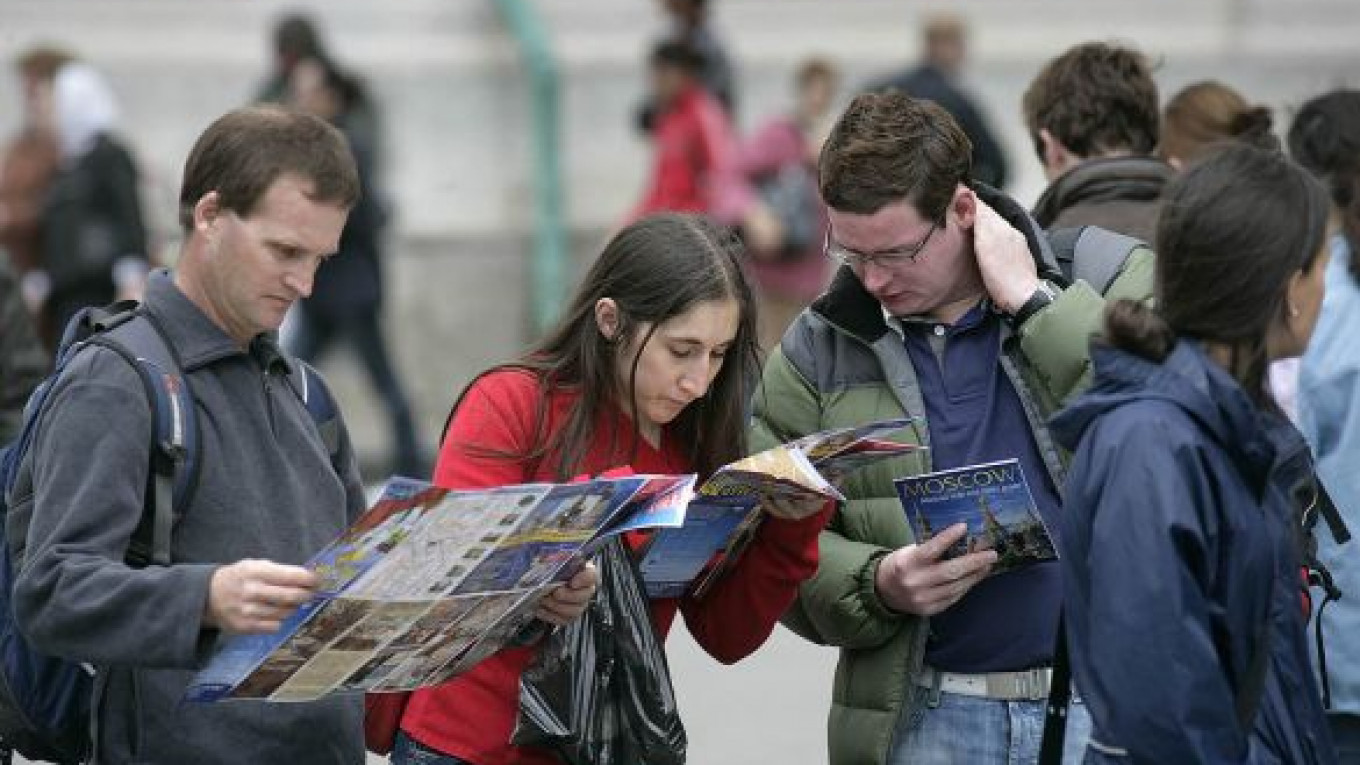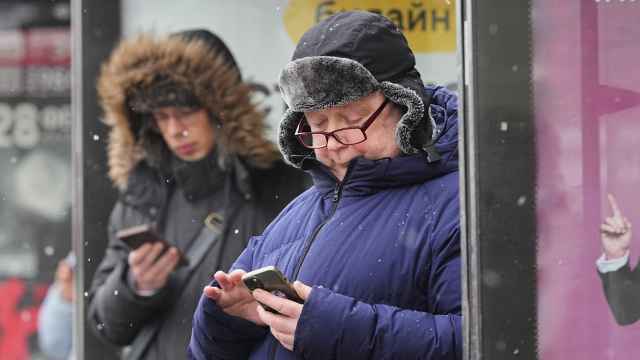U.S. diplomats approached the Russians in 2009 with an unprecedented proposal to ease cumbersome visa rules between the two countries by issuing three-year visas for most travelers as a general rule.
The Russian side seemed interested. But talks picked up only when Vladimir Putin got involved, which took two years, according to people familiar with the negotiations.
Putin declared to visiting Vice President Joe Biden on March 10, 2011, that both countries should abolish visas altogether.
"We would turn a very important page in our past and start all over again," said Putin, who was then serving as prime minister. "It would create an absolutely new moral atmosphere" between the countries.
Former Soviet republics
Armenia
Azerbaijan
Belarus*
Georgia
- Abkhazia*
- South Ossetia*
Kyrgyzstan*
Moldova
- Transdnestr*
Ukraine*
Uzbekistan
Africa
Botswana
Morocco
Namibia
Seychelles
Swaziland
Americas
Antigua and Barbuda
Argentina
Bahamas
Barbados
Brazil
Chile
Colombia
Cuba
Dominica
Ecuador
El Salvador
Grenada
Guatemala
Guyana
Honduras
Mexico**
Nicaragua
Peru
Saint Vincent and the Grenadines
Trinidad and Tobago
Uruguay
Venezuela
Asia and Oceania
Cook Islands
Fiji
Federated States of Micronesia
Guam
Hong Kong
Israel
Laos
Lebanon
Malaysia
Niue
Northern Mariana Islands
Philippines
Samoa
Thailand
Vanuatu
Vietnam
Europe
Bosnia and Herzegovina
Kosovo
Republic of Macedonia
Montenegro
Serbia
Turkey
* Countries or territories that allow Russians to enter on internal passports
** Visa-free entry allowed by registering online
Sources: Foreign Ministry, IATA
Biden appeared ambiguous about the stunning proposal, first saying "good idea." But then, pressed by Putin to sell the idea in Washington, he added: "Mr. Prime Minister, in case you haven't noticed, there's a real difference between being president and vice president."
It is unclear whether Putin was aware of the behind-the-scenes talks with the United States on easing visa rules when he made his bombshell statement.
But his comments prompted a flurry of activity in the Foreign Ministry, and the talks to ease visa rules picked up significantly, according to U.S. diplomats.
The Foreign Ministry did not respond to written questions for this article. Contacted by phone Friday, a spokesman asked that questions be submitted in writing, but no response had been received by Wednesday.
Russia and the United States are now closing in on a visa agreement that is making other Western countries envious.
While Russia has signed visa-free travel arrangements with Israel and many Latin American countries, progress with the European Union has been excruciatingly slow.
Despite Putin's support for visa-free travel with the United States, however, the talks didn't wrap up overnight.
About three months after Putin spoke with Biden, then-U.S. Ambassador John Beyrle announced the pending agreement at the St. Petersburg International Economic Forum.
He said that it would come into force within a month and that the three-year visas were "just the first step."
In July, experts from the Foreign Ministry and the U.S. State Department worked nonstop for five days to hammer out the eight-paragraph agreement in the run-up to a meeting between Foreign Minister Sergei Lavrov and Secretary of State Hillary Clinton.
"The atmosphere of the negotiations was very cordial," said a U.S. official, speaking on condition of anonymity because he was not authorized to speak to the media.
But the July meeting between Lavrov and Clinton came and went without the promised exchange of diplomatic notes. Lavrov said at the time that the deal had been held up by "formalities," a euphemism for the fact that Russian ministries had failed to agree on the text.
Lavrov and Clinton did finalize the agreement in Bali in November, but another hurdle remained: While the United States could immediately adopt the new rules, Russian law required that even the slightest change in the visa regime be ratified by both houses of parliament.
Hopes that the State Duma would handle ratification before the end of the year were dashed when lawmakers said they would rather wait until after December elections. It then took the new Duma several months to reconvene its policy committees.
Meanwhile, United Russia deputies suggested that they would rather wait for the outcome of presidential elections, first in Russia in March and then in the United States, where Barack Obama is running for re-election, in November.
As it turned out, the deputies could not have ratified the agreement anyway because the document remained at the Justice Ministry, where lawyers were double-checking the wording.
Only on May 25, more than six months after the Bali exchange, did newly appointed Prime Minister Dmitry Medvedev sign a decree sending the bill to the lower house of parliament.
The Duma is expected to vote on the bill before its current session ends in July, according to its website.
A senior United Russia lawmaker even suggested that ratification could happen this week. The Duma will try "to create a positive atmosphere" for Putin and Obama, said Andrei Klimov, first deputy chairman of the Duma's International Affairs Committee.
Both presidents met in Mexico on the sidelines of the G20 summit Monday.
Once ratified by the lower house, the document needs to be approved by the Federation Council, signed by the president and published in Rossiiskaya Gazeta, the government newspaper.
After that, the agreement will go into effect 30 days after both parties exchange another set of notes following ratification, according to a White House fact sheet published on the U.S. State Department's website.
The agreement stipulates that both countries provide three-year multiple entry visas to successful applicants in four categories: tourist, business, humanitarian and private. It does away with the requirement of written invitations. And it entitles American visa holders to stay up to six months at a time in Russia and Russians up to six months in America.
Additionally, both sides' visa holders are supposed to be able to return for another six months after simply crossing the border into a neighboring country.
One possible reason for the deal's difficulties is that it is in many ways asymmetric. While conditions are officially reciprocal, its effects will be felt more by Americans than by Russians, because U.S. consulates already give two-year multiple-entry visas to Russian applicants and do not demand written invitations.
The visas will be valid from the date of issue for three years. Under the current system, Russian consulates insist on an invitation and grant visas strictly for the period stated in the invitation.
Rules requiring residency registration within 10 days of arrival in Russia will remain, and Americans staying in hotels will still be required to make reservations.
Russians, however, will not need to provide a U.S. address, not even if they are staying in a hotel.
Americans, meanwhile, will no longer be required to obtain exit visas if they are traveling with replacements for lost or stolen passports.
But U.S. immigration authorities will continue to insist on personally interviewing first-time applicants, a practice that is not conducted by the Russian side.
EU Visas
Meanwhile, Moscow's talks with the European Union about liberalizing travel restrictions have dragged on for years, in large part because of disagreements within the 27-member bloc.
Both sides agreed in December to start a "common steps" process, basically a list of more than 40 conditions ranging from border infrastructure to passport safety.
Moscow has said it expects to meet those conditions by next year, after which negotiations about abolishing visas altogether could start.
Putin called for fast progress on visa-free travel with the EU during a Russia-EU summit in St. Petersburg earlier this month.
But EU officials have reacted cautiously to Russian officials' comments that visas would be scrapped in time for the 2014 Winter Olympics in Sochi.
In reality, Russian citizens already face different treatment depending on the EU country that they apply to visit.
EU countries that want to attract more Russian visitors, such as Spain and Italy, have started giving three- to five-year multiple-entry visas to second-time applicants, while those afraid of migration pressure, including Germany and some Eastern European members, handle visas much more restrictively.
Moreover, EU negotiations affect only Schengen zone members. Britain and Ireland, which opted to remain outside the open-border agreement, will remain untouched by any deals.
Russian travelers have responded by flocking to the consulates of countries with the friendliest policies. EU officials call this visa-shopping, and they don't like it.
After being flooded with applications this spring, French consulates reduced the application period to 10 days before travel.
More promising is a second set of negotiations now under way between Russia and the EU for a facilitation agreement that would introduce longer-term multiple-entry visas for some applicants, including businesspeople, journalists, scientists and students.
But these talks, too, have stalled, because Moscow has insisted on including "service passport" holders in the agreement. Also known as official passports, these documents are carried by members of federal and regional governments throughout Russia.
Many EU member countries do not have any equivalent for them.
This has alarmed some EU countries, which have raised security concerns, said a European negotiator, requesting anonymity because he was not authorized to speak to the media.
One of the skeptics' arguments is that Moscow cannot even say for sure how many people hold service passports.
"The estimates range from 10,000 to 40,000," the negotiator said.
A Message from The Moscow Times:
Dear readers,
We are facing unprecedented challenges. Russia's Prosecutor General's Office has designated The Moscow Times as an "undesirable" organization, criminalizing our work and putting our staff at risk of prosecution. This follows our earlier unjust labeling as a "foreign agent."
These actions are direct attempts to silence independent journalism in Russia. The authorities claim our work "discredits the decisions of the Russian leadership." We see things differently: we strive to provide accurate, unbiased reporting on Russia.
We, the journalists of The Moscow Times, refuse to be silenced. But to continue our work, we need your help.
Your support, no matter how small, makes a world of difference. If you can, please support us monthly starting from just $2. It's quick to set up, and every contribution makes a significant impact.
By supporting The Moscow Times, you're defending open, independent journalism in the face of repression. Thank you for standing with us.
Remind me later.







